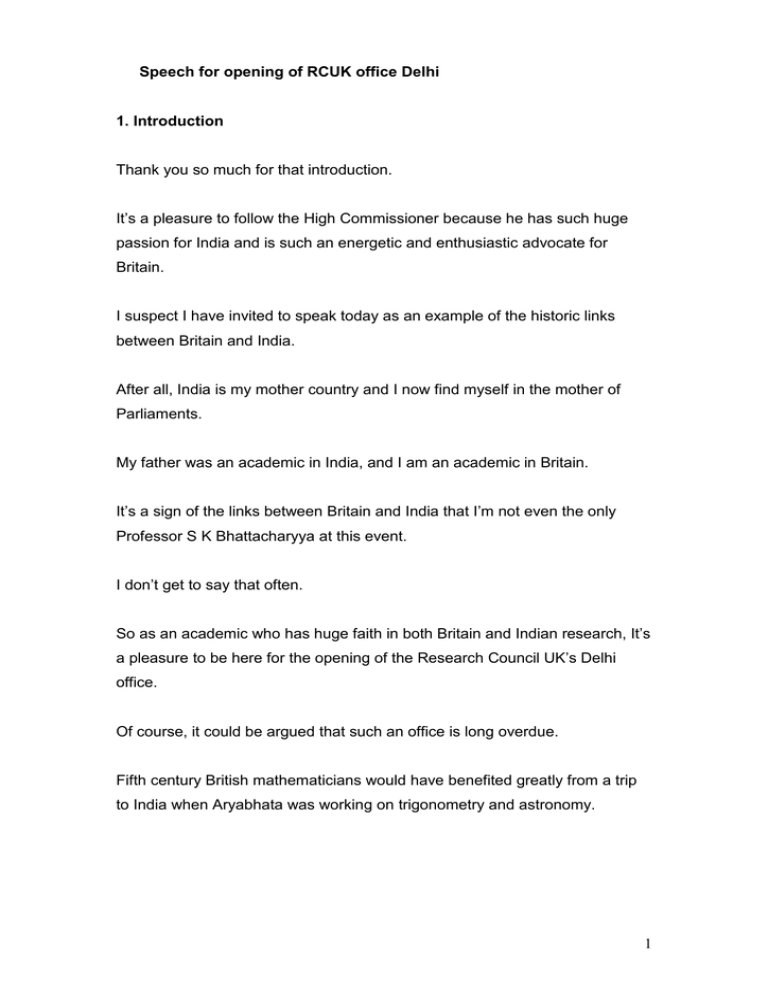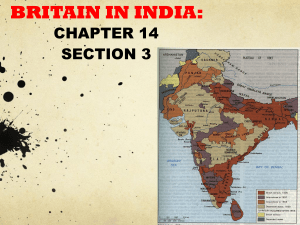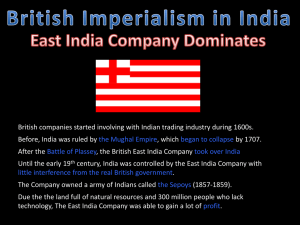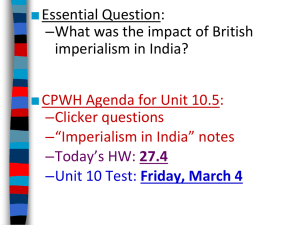Thank you so much for that introduction. 1. Introduction
advertisement

Speech for opening of RCUK office Delhi 1. Introduction Thank you so much for that introduction. It’s a pleasure to follow the High Commissioner because he has such huge passion for India and is such an energetic and enthusiastic advocate for Britain. I suspect I have invited to speak today as an example of the historic links between Britain and India. After all, India is my mother country and I now find myself in the mother of Parliaments. My father was an academic in India, and I am an academic in Britain. It’s a sign of the links between Britain and India that I’m not even the only Professor S K Bhattacharyya at this event. I don’t get to say that often. So as an academic who has huge faith in both Britain and Indian research, It’s a pleasure to be here for the opening of the Research Council UK’s Delhi office. Of course, it could be argued that such an office is long overdue. Fifth century British mathematicians would have benefited greatly from a trip to India when Aryabhata was working on trigonometry and astronomy. 1 But despite the slow start the British had, I want to tell my Indian colleagues that we’re doing better now, and I can honestly say that Britain’s not still in the dark ages! The Work foundation recently published a report calling for a “special relationship” between Britain and India. It’s an excellent report because it recognises the huge changes in India since 1991, and the way in which growth has been unleashed and is transforming India. With this enormous growth comes a change in the cultural and diplomatic terms of trade. We are all a bit too used to the idea of the West and East in the role of developed and developing because that’s what has applied in our lifetimes. It’s useful to take a longer perspective. The researchers behind the website worldmapper.com recently produced a fascinating series of maps showing wealth changing over time. Two thousand years ago Britain and Western Europe - barring Italy - was but a tiny sliver on a map of world wealth while China and India were gargantuan. By the nineteenth century the positions had reversed. Today we see a trend of massive and rapid accumulation of wealth in India and China again. Indian businesses are succeeding in global markets, from Tata to Mittal, to Wipro and Infosys. If you go to the research laboratories in top American universities you will find legions of brilliant Indian graduates. 2 Even the Americans have now realised how important relations with India are, as the signing of the Nuclear agreement shows. So one might wonder why India should want a special relationship with the UK. I think there are three good reasons. First the cultural, population and heritage links that we are all aware of. Second the markets our countries represent. On the one hand India’s billion citizens driving growth forward and on the other the European Union, a giant market, where the historic links I mentioned make the UK a natural base for India’s expansion in Europe. Then, most importantly for research purposes, there’s our shared expertise in the common challenges we face. A few short decades ago, we saw economic and scientific challenges primarily as national or regional issues. The needs of nations like Britain and India were localised and differentiated. In the sixties, if I had wandered the streets of my new home of Birmingham and explained that the problems people faced were essentially the same as the challenges faced by a resident of Bangalore, I would have been laughed at. Today from healthcare to the environment we are all aware of the great generational global challenges we face. I believe that these problems will primarily be solved by research successes. That means collaborative scientific research must be at the centre of our research priorities. 3 Since India and the UK have such strong academic and research traditions we are both well placed to exploit this opportunity – but we will do so even faster if we go forward together. 3. Healthcare The first of the great technological challenges of the twenty-first century is health care. As we grow more prosperous, the ability to extend and preserve life will become available to billions more. This also brings the potential for huge costs and pressure on scarce resources. So we must make surprising multi-disciplinary moves, like incorporating leading edge digital technology and engineering expertise in healthcare process management. In the last few years I have seen that many of the problems faced in providing healthcare worldwide can be addressed by this same understanding of technology and processes. The fundamental challenge for hospital managers is to maximise the effective utilisation of costly healthcare equipment and optimise the throughput of patients. Engineers and mathematicians have been modelling problems like this in manufacturing plants - models that can now be adapted for hospitals and triage systems. 4 Or take the work that Oxford University and India’s leading cancer centres are doing together to develop oncology trials – because we know that in a few years seventy per cent of the Worlds cancer cases will be in the developing world, and if we do the research together now, we will save lives later. These examples show how working together will bring us solutions faster. 4. E-security After preserving life, providing security will be a key element in ensuring the growth of the global economy. We all live in the shadow of modern terrorism. Terror has become the great destabilising force in democratic societies, the knowledge that a small group of people with murderous intent can cause havoc anywhere and to anybody. The massive flows of data and people that make international terrorism so threatening also mean that security of information is not an issue restricted to intelligence services. As information is centralised and stored electronically it becomes vulnerable to those that wish to access it for malicious purposes, for example identify theft and financial fraud. To fight this we can draw on the power of applied mathematics. We have recently created a new e-security group at Warwick which combines mathematicians with expertise from the defence sector to highlight the problem and focus on helping companies, large and small. 5 This is an area where Indian researchers have excelled. For just one example, look at the IVIZ Techno Solutions Company set up by computer science graduates Bikash Barai and Nilanjan De. IVIZ has developed innovative automated end to end penetration testing of systems [PAUSE] and attracted $2.5m of investment. This is just one example of countless where we can work together for mutual benefit. 5. Climate change and resource demand The final and the biggest challenges are the twin issues of climate change and globally increased demand for energy. We know that we will need more energy to ensure our economies grow. We also know that the energy we produce now has an unacceptable impact on the environment. That tension creates a double role for researchers. First we need to develop ways of maximising energy efficiency. Second, we need to find new sources of energy. Take cars. Allowable particulate matter emissions from vehicles are to fall tenfold from over the next few years in both Europe and India, while Nitrous Oxide emissions must fall from point one five of a gram to point zero six of a gram. Meeting those challenges will be tough for all car manufacturers. So we need to look at Low Carbon Vehicles from the bottom up. 6 For example the in-mould painting process we developed and patented at WMG has been applied by companies worldwide, including in India. In mould painting reduces the need for paint shops, which consume 40% of the entire energy used in vehicle production. Yet even with those changes, greater solutions will be needed in the long term. The new generation of cars, like India’s Tata Nano, meet tough new emissions regulations, but as the global economy grows the number of cars purchased will also grow. That requires research that looks at new ways to build and run cars. Lightweight materials are an area where Indian researchers have made a major contribution including innovative work on aerospace materials. Bringing together Lightweight materials and new sources of materials could transform car weights and environmental impacts. All this underlines the importance of collaboration. To make the necessary major impact requires coordinated effort at both a national and international level. This will become more important as demand for energy becomes one of the defining features of our global environment. We can see the after effects of increasing energy demand, not just in oil prices, but in the conflicts today in Georgia, in the debate over the future of Iran’s nuclear programme, and in the politics of the Middle East. 7 Many of these social conflicts are ripples caused by the need for economies to secure their energy future. So if we can find ways of managing that demand more effectively the long term consequences will not just be less polluting cars or more efficient factories, but a less dangerous world. In short, the more scientific solutions we apply, The less pressure on resources there will be, And the lower the risk of human conflict and tragedy. 6. Importance of collaboration The issues we face are enormous. Yet so is the initiative to address them being shown around the world. The key to success is global collaboration and partnership. That means equal partnerships at all levels. Between disciplines. Between institutions, Between research teams. This belief in global partnerships is why I am so delighted that Research councils UK are opening an office in Delhi, and why my own WMG is focussing so much or building collaborative projects with Indian Universities 8 Just this summer WMG and IIT Kharagpur signed a Memorandum of Understanding enabling us to explore opportunities for collaboration in research, education and knowledge transfer in the three vital areas I have discussed today. The international importance of this work was underlined when British Prime Minister Gordon Brown opened our Digital Laboratory in July. Here we plan to harness the new opportunities provided by digital media and the rapid move to on-line delivery of content – be it news, entertainment or education – and we will be doing so in collaboration with Indian universities and recruiting Indian researchers to lead key projects. 7. Conclusion Since I moved from India to the UK the world has changed. We have achieved much in that time, yet the transforming world around us means we too have to change. Instead of specific national or regional issues, shared global challenges define our new world. We face a climate crisis that threatens to change the very structure of the world around us. We face pressure on natural resources like oil and coal at the same time as populations demand ever higher standards of living. We face a world where the demand for health care will increase even faster than our population. We face a world where the failing of a financial system in one country; 9 Or a leak of technology from one company; Can have profound consequences for every country and economy. These are huge challenges. Which means this is an unprecedented opportunity. Our shared challenges can act as an inspiration to scientists and technologists to work together to deal with the issues facing the global community. It’s a huge responsibility. How can scientists from different cultures, different backgrounds and different fields possibly find the solutions the world desperately needs? To resolve these challenges and ensure improving quality of life worldwide will require scientific solutions, applicable globally. Our response has to be one of co-operation and multi disciplinary focus. The risk is that we only travel at the pace of the slowest. The opportunity is that we bring researchers together and give them the opportunity to collaborate and create joint ventures to make progress faster and more effectively than ever. We have a lot to learn from each other about developing multi disciplinary collaboration and equal partnerships. We all have a responsibility to learn, share and grow together. I am sure that together, we will do just that. Thank you. 10






